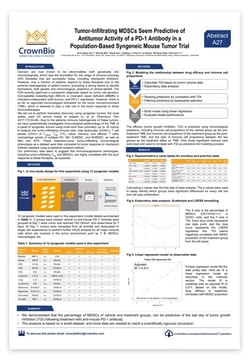Poster A27: Immunosuppressive Phenotype and Poor I/O Agent Response Correlation
Tumor-Infiltrating MDSCs Seem Predictive of Antitumor Activity of a PD-1 Antibody in a Population-Based Syngeneic Mouse Tumor Trial
Annie Xiaoyu An, Binchen Mao1, Sheng Guo, Tingting Li, Ying Jin, Lan Zhang, WenQing Yang, and Henry Q.X. Li
 While checkpoint inhibitors are proving highly successful in oncology, a large proportion of patients do not respond to these treatments. This is due to the extreme heterogeneity of patient tumors, prompting a strong desire to identify biomarkers, both genetic and immunological, which could predict clinical benefit.
While checkpoint inhibitors are proving highly successful in oncology, a large proportion of patients do not respond to these treatments. This is due to the extreme heterogeneity of patient tumors, prompting a strong desire to identify biomarkers, both genetic and immunological, which could predict clinical benefit.
So far, there is no approved immunological biomarker for the tumor microenvironment (TME), which is believed to play a critical role in tumor response to immunotherapy.
To meet this need, CrownBio set out to perform biomarker discovery using syngeneic tumors, currently the most commonly used immuno-oncology model.
Read this Poster to Discover:
- The systematic investigation of the immunological epidemiology of syngeneic tumor TME using multi-color flow cytometry (up to 16 colors) to analyze tumor-infiltrating immune cells.
- That the percentage of MDSCs for vehicle and treatment groups, can be predictive of the last day of tumor growth inhibition following treatment with anti-PD-1 antibody.
- How immunosuppressive phenotypes, including tumor-infiltrating Treg and MDSCs, are highly correlated with poor response to immunotherapies, as expected.
Download the Poster Now!

 While checkpoint inhibitors are proving highly successful in oncology, a large proportion of patients do not respond to these treatments. This is due to the extreme heterogeneity of patient tumors, prompting a strong desire to identify biomarkers, both genetic and immunological, which could predict clinical benefit.
While checkpoint inhibitors are proving highly successful in oncology, a large proportion of patients do not respond to these treatments. This is due to the extreme heterogeneity of patient tumors, prompting a strong desire to identify biomarkers, both genetic and immunological, which could predict clinical benefit.
